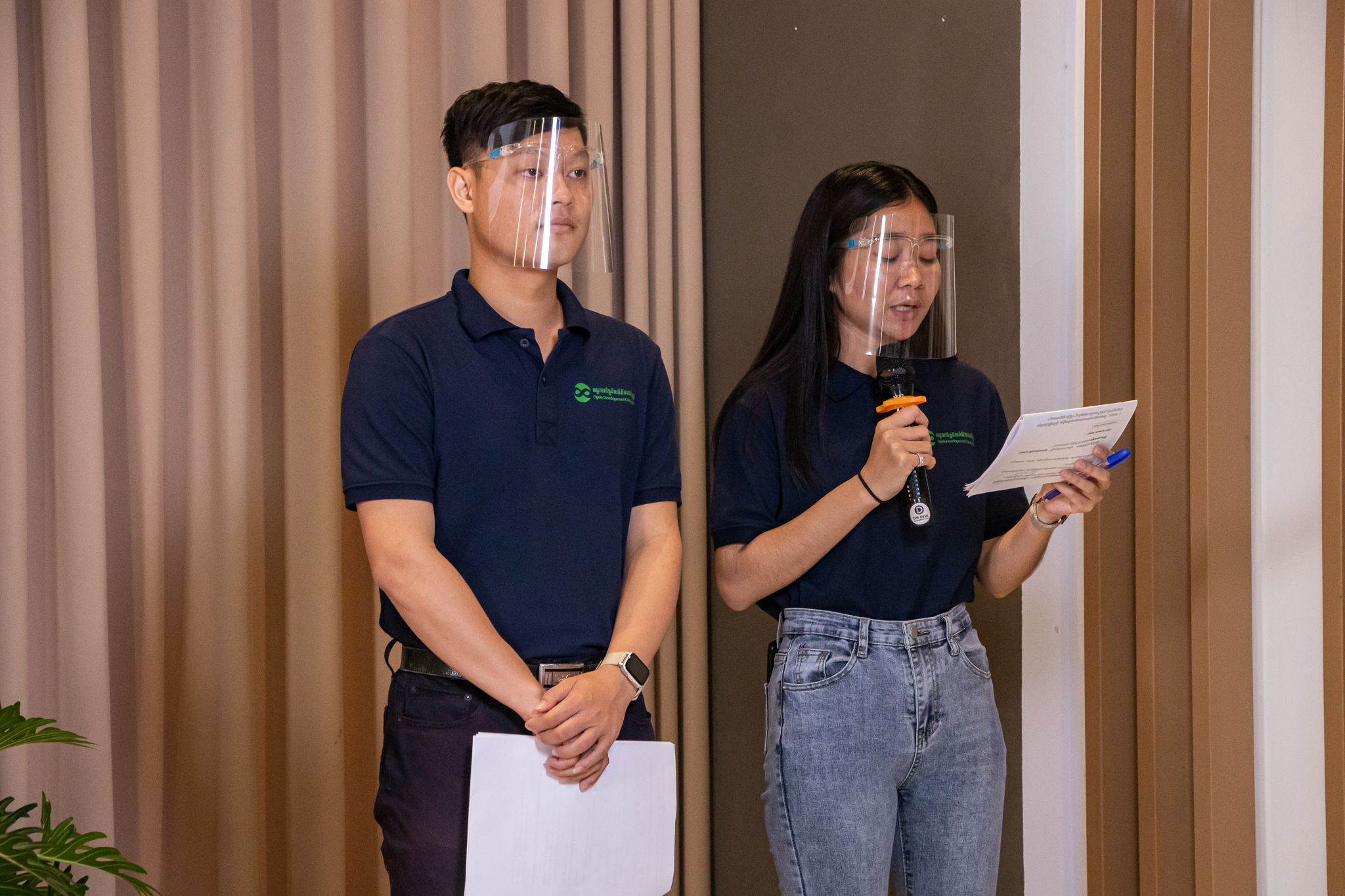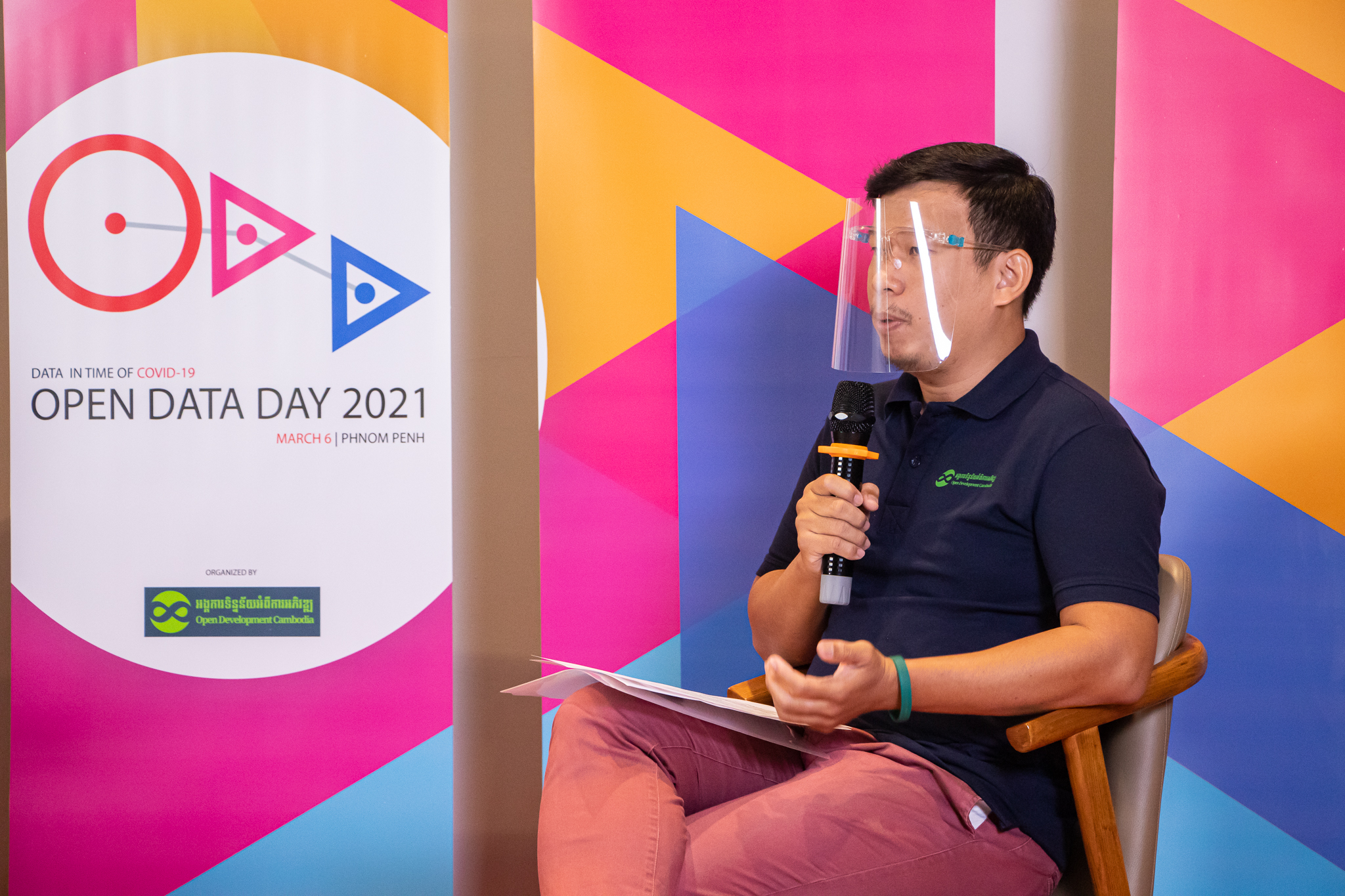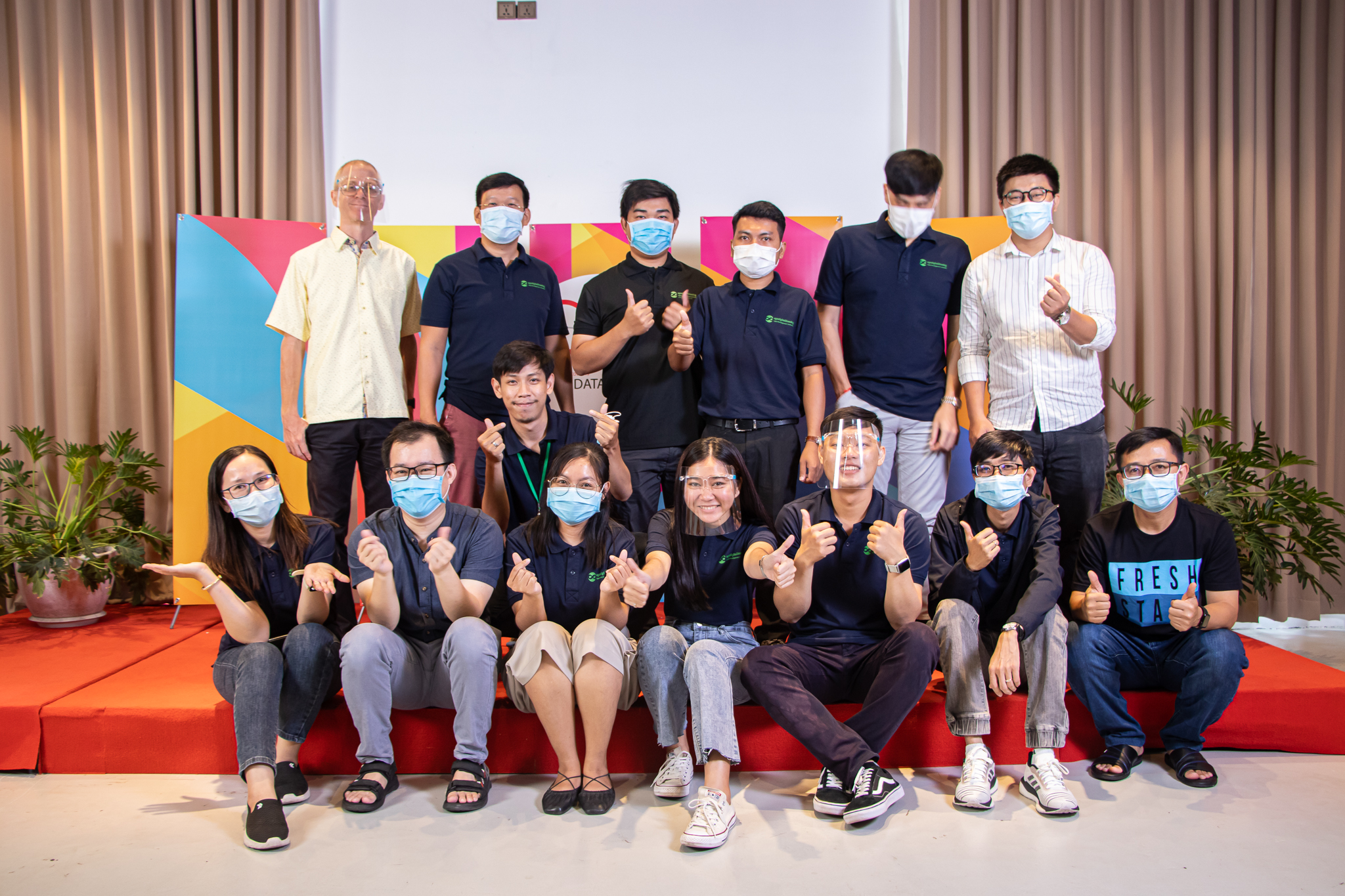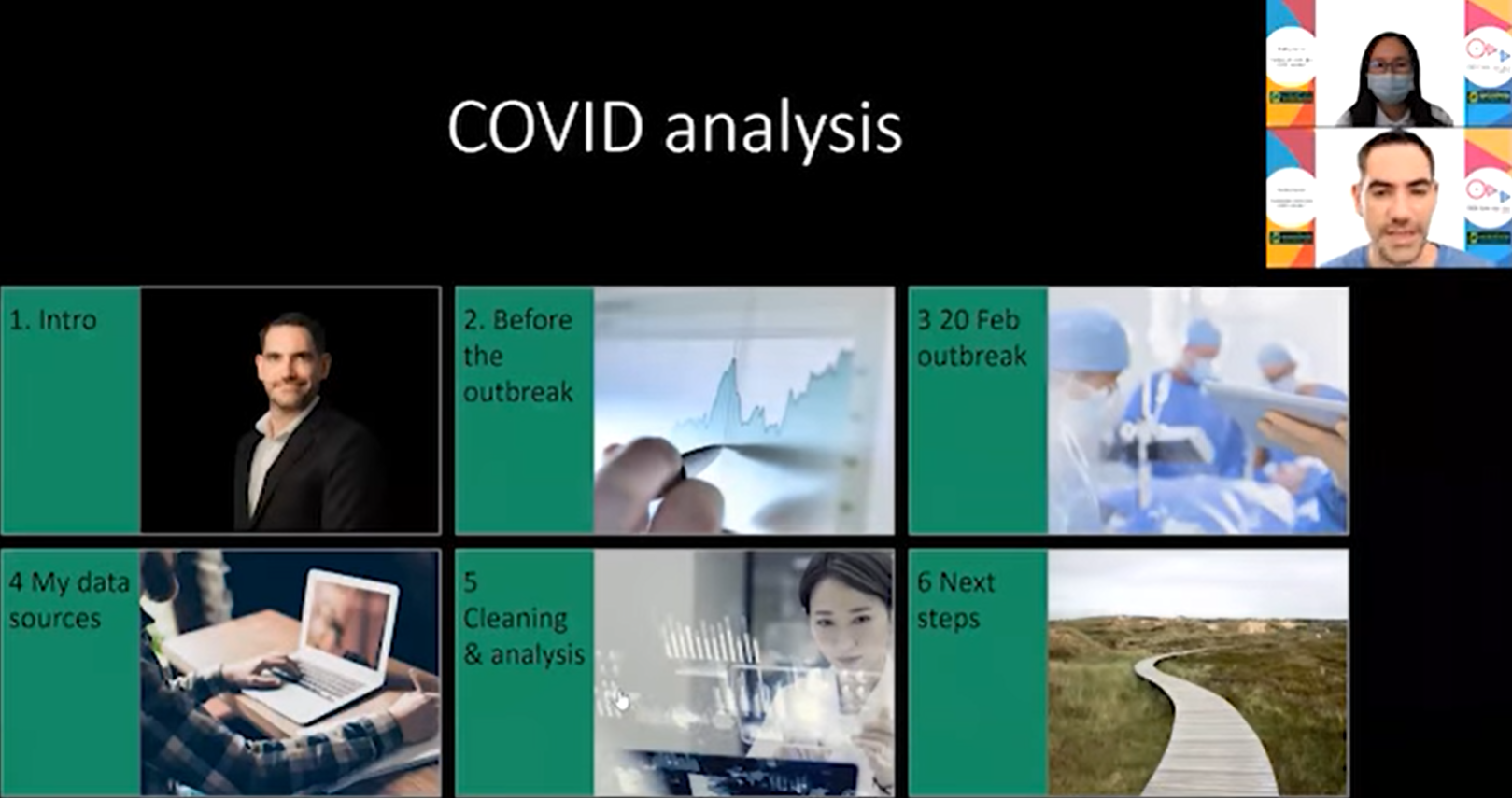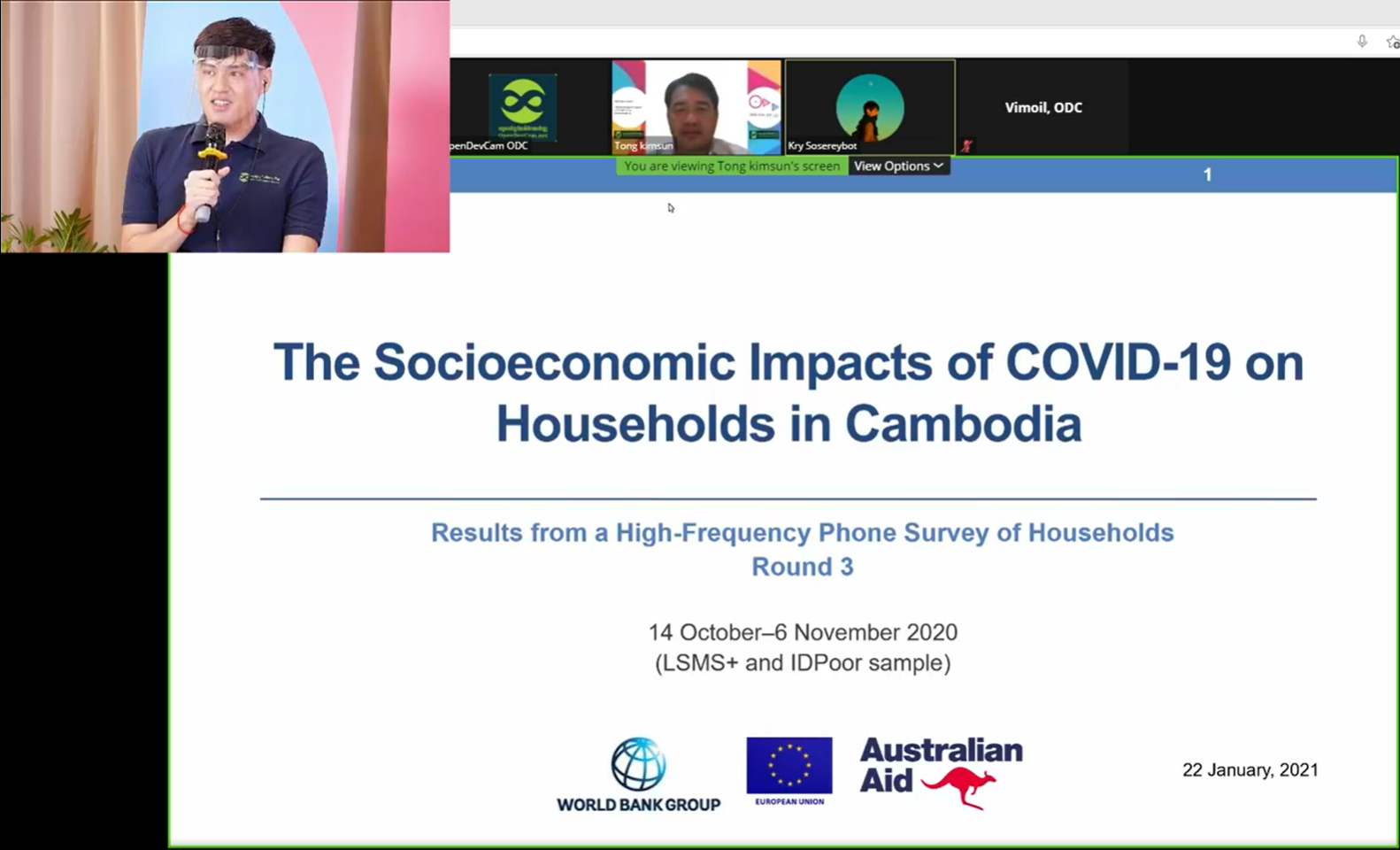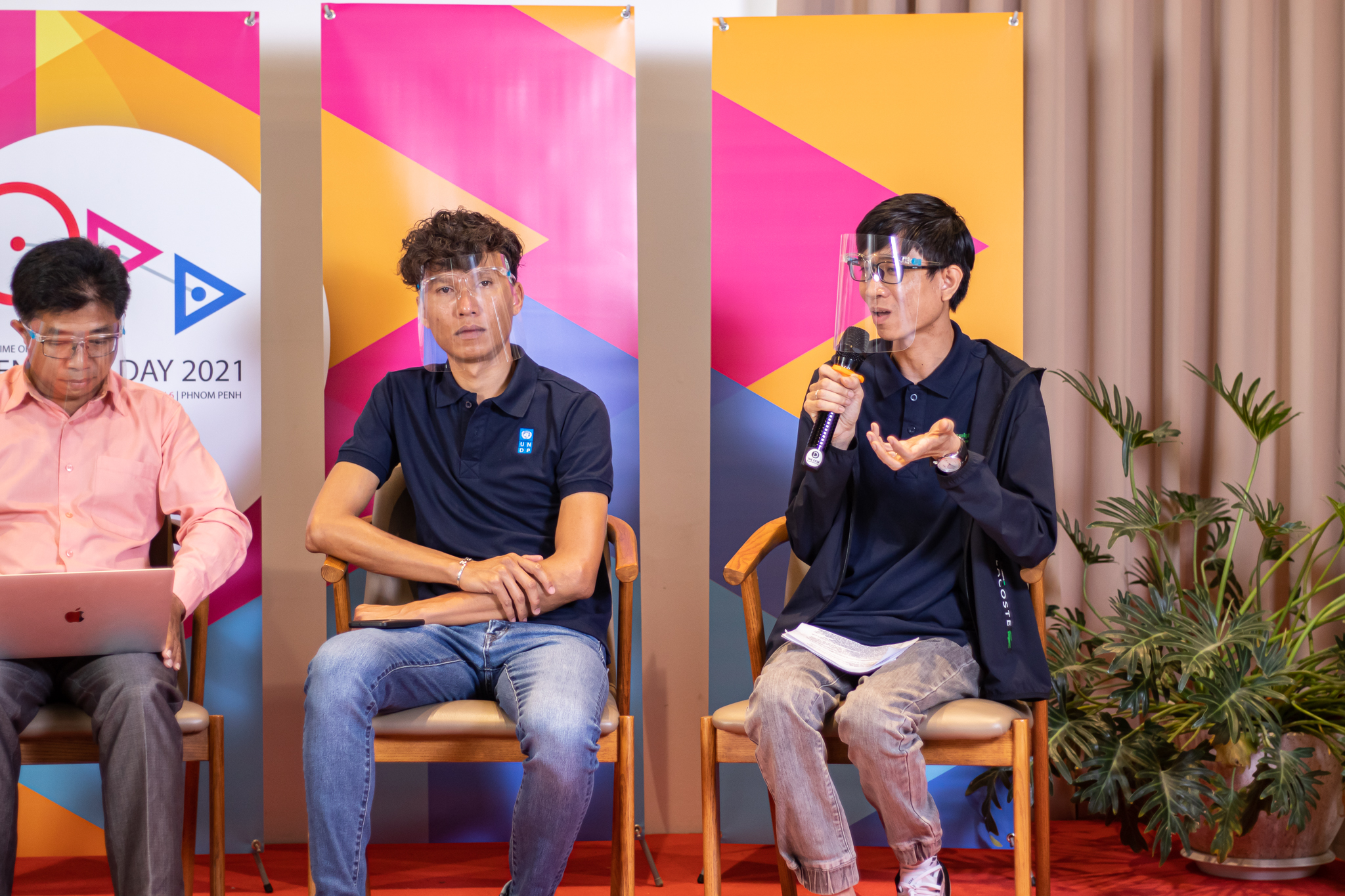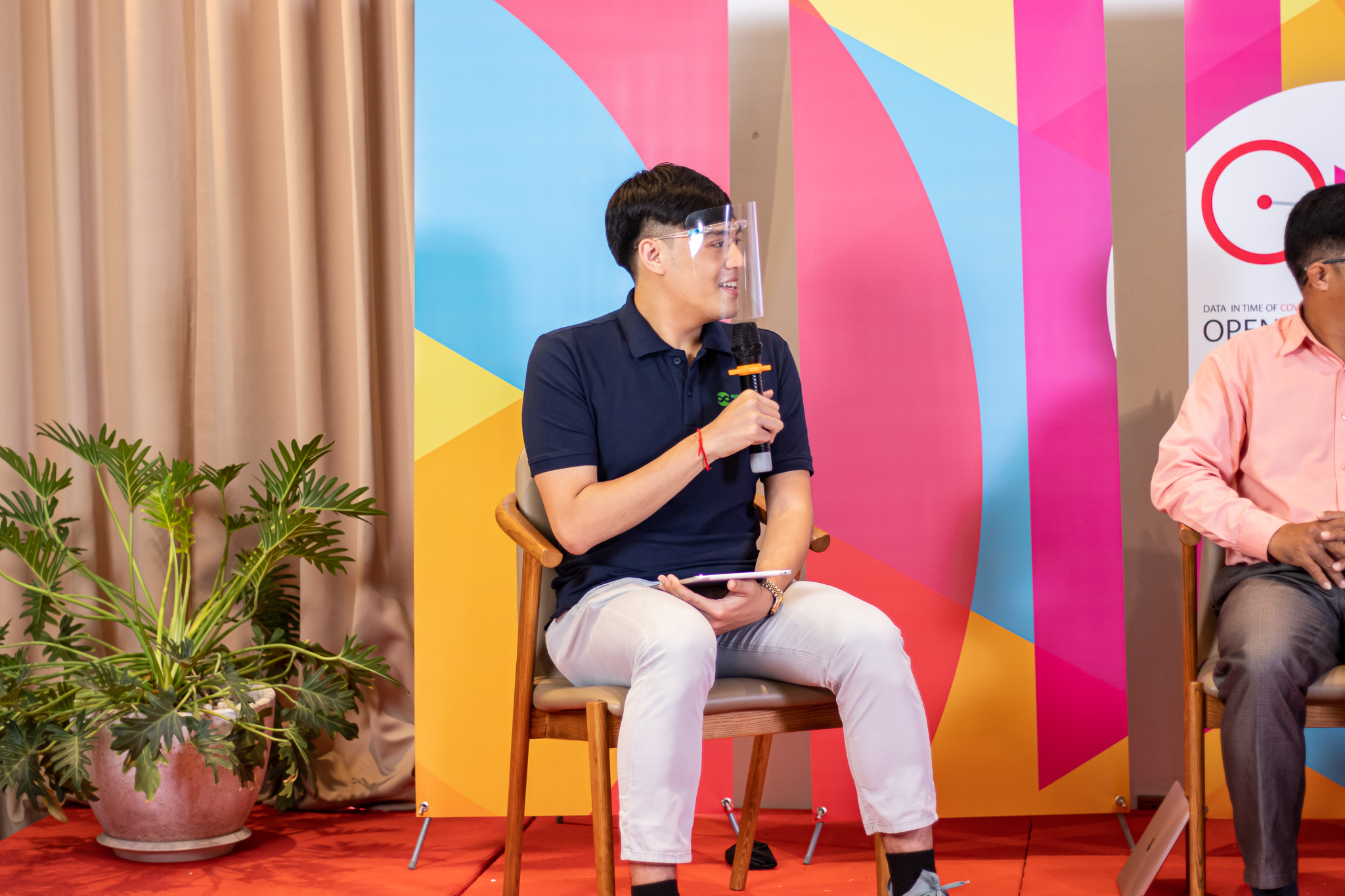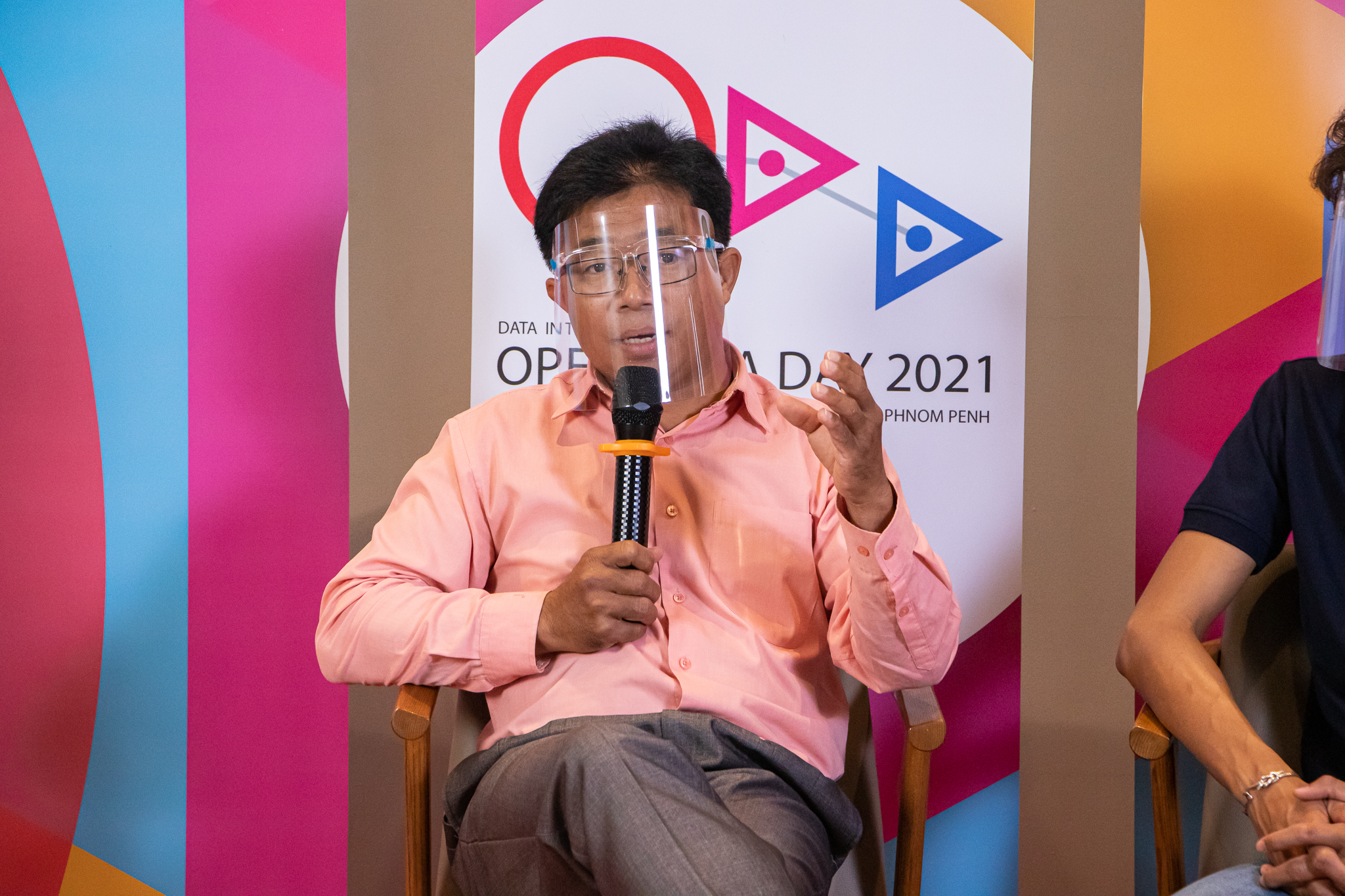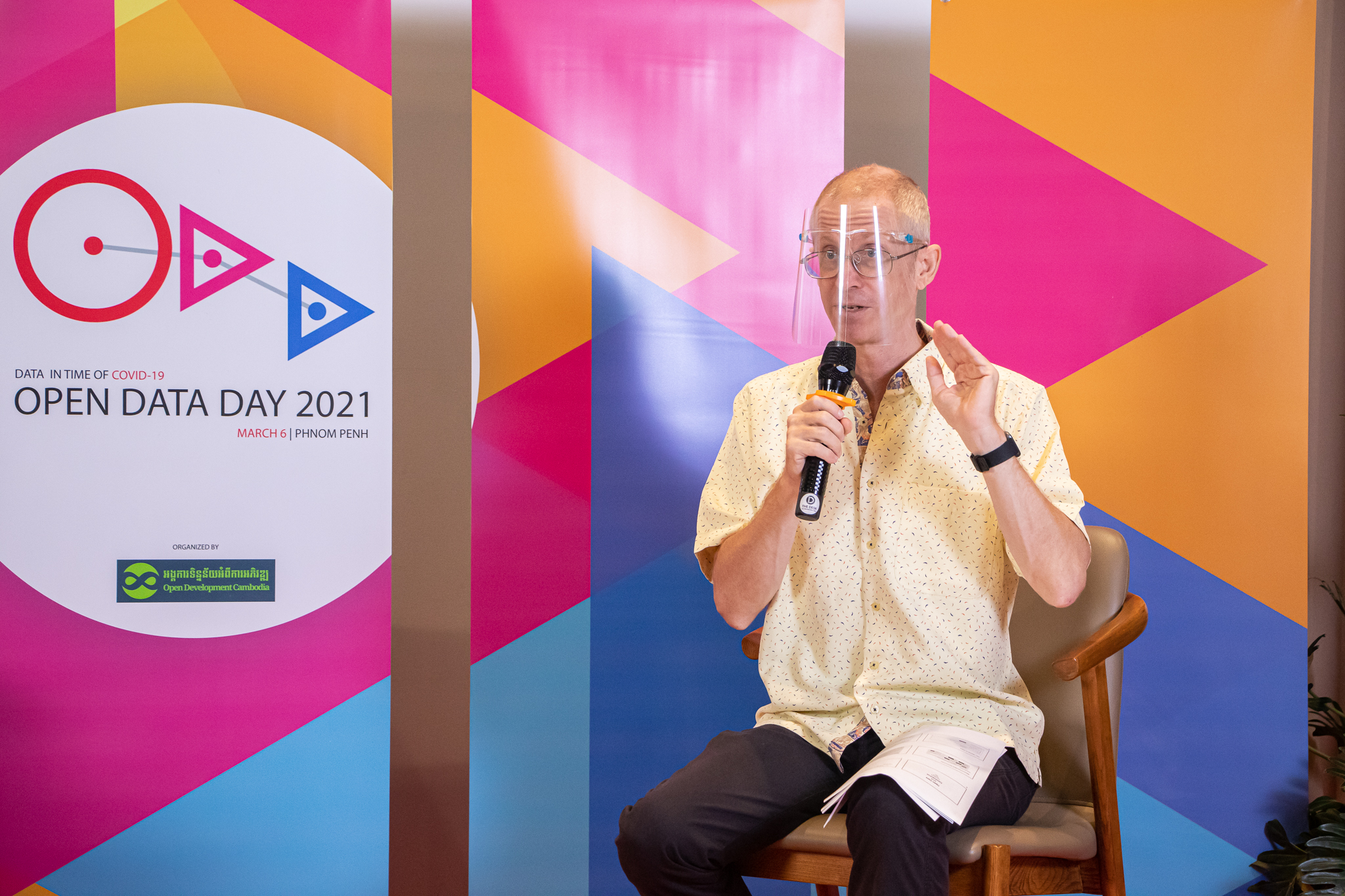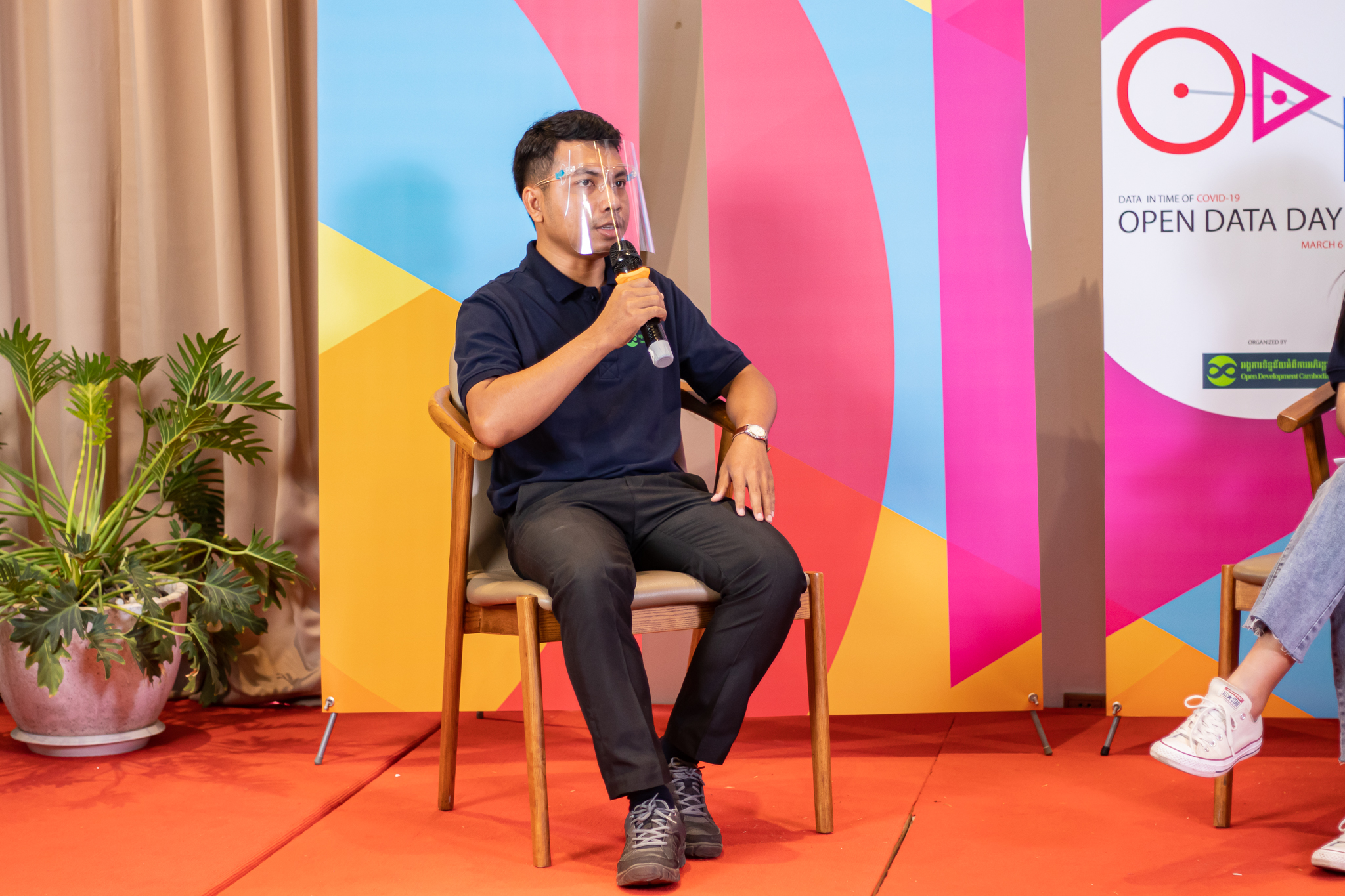ទិវាទិន្នន័យបើកទូលាយអន្តរជាតិឆ្នាំ ២០២១៖ ទិន្នន័យនៅក្នុងបរិបទកូវីដ-១៩
នៅថ្ងៃទី ០៦ ខែមីនា ឆ្នាំ២០២១ អង្គការទិន្នន័យអំពីការអភិវឌ្ឍ (អូឌីស៊ី) និងសមាគមន៍អាយស៊ីធី បានប្រារព្ធទិវាទិន្នន័យបើកទូលាយអន្តរជាតិ ដោយបានរៀបចំសិក្ខាសិលាដែលមានរយៈពេលកន្លះថ្ងៃ ក្រោមប្រធានបទ “ទិន្នន័យនៅក្នុងបរិបទកូវីដ-១៩”។ សិក្ខាសិលានេះបានផ្សាយផ្ទាល់នៅលើទំព័រហ្វេសប៊ុកផ្លូវការរបស់អូឌីស៊ីសម្រាប់សាធារណៈជនដែលនៅក្នុងបណ្តាញអ៊ីនធឺណិត។
សិក្ខាសិលានេះ ត្រូវបានចាប់ផ្តើមជាមួយនឹងការគោរពភ្លេងជាតិនៃប្រទេសកម្ពុជា និងការថ្លែងសុន្ទរកថាបើកកម្មវិធីពីសំណាក់ លោក ធី ទ្រី នាយកប្រតិបត្តិអង្គការអូឌីស៊ី និង លោក John Weeks អ្នកឯកទេសខាងទិន្នន័យបើកទួលាយដែលមកពី Internews។ នៅក្នុងឆ្នាំ ២០២១ នេះគឺជាឆ្នាំគម្រប់ខួបទី ៧ ដែលអូឌីស៊ីបានចូលរួមក្នុងទិវាទិន្នន័យបើកទួលាយ។ លោក ធី ទ្រី បានពន្យល់បន្ថែមទៀតថា ទិវាទិន្នន័យបើកទូលាយក្នុងឆ្នាំនេះនឹងត្រូវបានធ្វើឡើងខុសពីមុន ខណៈកម្មវិធីសិក្ខាសិលាផ្សេងៗនៅកម្ពុជាត្រូវធ្វើឡើងនៅលើបណ្តាញសង្គម។ សិក្ខាសិលានេះត្រូវបានផ្លាស់ប្តូរមកជាទម្រង់ធ្វើតាមប្រព័ន្ធអ៊ីនធឺណិតវិញ ដោយសារតែអត្រាកើនឡើងនៃការឆ្លងរីករាលដាលនៃជំងឺកូវីដ-១៩ នៅក្នុងប្រទេសកម្ពុជា ក៏ដូចជាក្នុងគោលបំណងដើម្បីទទួលបានអ្នកចូលរួមកាន់តែទូលំទូលាយ និងច្រើនជាងមុនផងដែរ។
លោកបានមានប្រសាសន៍ថា សិក្ខាសិលានេះពិតជាមានសារៈសំខាន់ណាស់ ព្រោះវាអាចធ្វើឱ្យមានការចូលរួមពីសំណាក់អ្នកពាក់ព័ន្ធទាំងអស់ដែលធ្វើការពឹងផ្អែកលើទិន្នន័យ ក្នុងគោលបំណងដើម្បីអភិវឌ្ឍន៍គោលនយោបាយ និងផ្តល់បរិយាកាសសមស្រប សម្រាប់ការបើកទូលាយនូវទិន្នន័យដែលអាចចូលទៅប្រើប្រាស់បានយ៉ាងងាយស្រួល។ លោកក៏បានបន្ថែមផងដែរថា ប្រធានបទ “ទិន្នន័យនៅក្នុងបរិបទជំងឺកូវីដ-១៩” គឺពាក់ព័ន្ធទៅនឹងស្ថានភាពបច្ចុប្បន្ន នៅពេលដែលជំងឺរាតត្បាតបានជះឥទ្ធិពលដល់សុខុមាលភាពផ្នែកសេដ្ឋកិច្ច និងសង្គមរបស់ប្រទេសជាច្រើននៅជុំវិញពិភពលោក រួមទាំងប្រទេសកម្ពុជាផងដែរ។ ដូច្នេះ ទិន្នន័យបើកទូលាយមានសារៈសំខាន់ណាស់សម្រាប់រដ្ឋាភិបាល និងអ្នកជាប់ពាក់ព័ន្ធដទៃទៀត ក្នុងការធ្វើសេចក្តីសម្រេចចិត្តដាក់ចេញនូវគោលនយោបាយ ដើម្បីដោះស្រាយបញ្ហាទាំងនោះឱ្យបានទាន់ពេលវេលា និងមានប្រសិទ្ធិភាព។
គោលបំណងរបស់សិក្ខាសិលានេះរួមមាន ទី១) ដើម្បីលើកកម្ពស់ការយល់ដឹងអំពីការប្រើប្រាស់សក្តានុពលនៃទិន្នន័យបើកទូលាយ និងសារៈសំខាន់នៃភាពអាចរកទិន្នន័យបាន ការផ្សព្វផ្សាយ និងការប្រើប្រាស់ទិន្នន័យនិងព័ត៌មានក្នុងអំឡុងពេលជំងឺរាតត្បាត។ ទី២) ដើម្បីប្រមូលផ្តុំក្រុមមនុស្សផ្សេងៗគ្នាមកពិភាក្សាអំពីបញ្ហាប្រឈម ក្នុងការទទួលបានទិន្ន័យស្ដីពីផលប៉ះពាល់សេដ្ឋកិច្ច និងសង្គមនៅប្រទេសកម្ពុជា និង ទី៣) ដើម្បីជំរុញការប្រើប្រាស់ទិន្នន័យបើកទូលាយ និងរឿងរ៉ាវដែលពឹងផ្អែកលើទិន្នន័យ ដើម្បីពង្រឹងការការពារសុវត្ថិភាពសង្គមនៅកម្ពុជា និងការងើបឡើងវិញក្រោយពេលជំងឺរាតត្បាត។
លោក John Weeks បានធ្វើសេចក្តីណែនាំនៃវគ្គបន្ទាប់ ស្តីពីការដាក់បង្ហាញនូវលទ្ធផលនៃការស្ទង់មតិទិន្នន័យបើកទូលាយនៅឆ្នាំ ២០២០ ដែលមានបទបង្ហាញត្រូវបានថតទុកជាមុនពីសំណាក់លោក វ៉ាមឿន និមល និងកញ្ញា Julia Garcia Puig។ គោលបំណងនៃការសិក្សា ទី១) ដើម្បីវិភាគបរិបទបច្ចុប្បន្ននៃទិន្នន័យបើកទូលាយនៅកម្ពុជា និង ទី២) ដើម្បីស្វែងរកឱកាសក្នុងការអភិវឌ្ឍន៍ភាពដែលអាចចូលទៅប្រើប្រាស់បាននៃទិន្នន័យបើកទូលាយនៅកម្ពុជា។ លោក និមល បានបង្ហាញថាទិន្នន័យបើកទូលាយមានលក្ខណៈចម្បងចំនួន ៣ គឺភាពអាចរកបាន និងភាពអាចចូលប្រើប្រាស់បាន ការប្រើប្រាស់ឡើងវិញ និងការចែកចាយឡើងវិញ និងការចូលរួមជាសកល។ ធាតុចូលទាំងនេះ ត្រូវបានប្រមូលពីគេហទំព័រ និងសំណុំទិន្នន័យពីស្ថាប័នចម្រុះរួមមានសកលវិទ្យាល័យ ក្រុមអង្គការសង្គមស៊ីវិល អ្នកសារព័ត៌មាន ស្ថាប័នរដ្ឋាភិបាល និងសាធារណៈជនទូទៅ។
លោក និមល ក៏បានកត់សម្គាល់ផងដែរពីមានបញ្ហាទាក់ទងនឹងការវិភាគលើប្រភពព័ត៌មានដែលចេញពីស្ថាប័នរដ្ឋាភិបាល ពីព្រោះព័ត៌មានទាំងនោះមានទម្រង់ជាប្រភេទឯកសារដែលមិនអាចវាយតម្លៃបានដោយការប្រើប្រាស់កុំព្យូទ័រ។ លោកបានបញ្ជាក់ថា រដ្ឋាភិបាលចាំបាច់ត្រូវផ្តល់លទ្ធភាពក្នុងការទទួលបានទិន្នន័យរបស់ពួកគេ ពីព្រោះយោងតាមការសិក្សាប្រមាណ ៧០% នៃអ្នកដែលបានស្ទង់មតិបានទទួលទិន្នន័យពីរដ្ឋាភិបាល។ លោកក៏បានបង្ហាញផងដែរថា ពួកគេបានប្រឈមមុខនឹងបញ្ហាមួយចំនួន ដូចជាទិន្នន័យឆៅដែលអាចរកបាននៅមានកម្រិត កង្វះកិច្ចសហប្រតិបត្តិការរបស់រដ្ឋាភិបាល និងចំណេះដឹងមានកម្រិតស្តីអំពីទិន្នន័យបើកទូលាយ។ លោកបានបង្ហាញជាអនុសាសន៍គោលនយោបាយ ដូចជាការរៀបចំបង្រួមស្ថាប័នរដ្ឋាភិបាលដើម្បីសម្របសម្រួលការអភិវឌ្ឍទិន្នន័យបើកទូលាយ កសាងបណ្តាញហេដ្ឋារចនាសម្ព័ន្ធទិន្នន័យបើកទូលាយ និងបង្កើនចំណេះដឹងផ្នែកទិន្នន័យក្នុងចំណោមអ្នកប្រើប្រាស់ និងអ្នកផ្ដល់ទិន្នន័យ។
នៅវគ្គបន្ទាប់គឺជាកិច្ចពិភាក្សាតុមូលដែលសម្របសម្រួលដោយ លោក បាន ចន្ទផល្លា ជាអ្នកស្រាវជ្រាវផ្នែកសង្គម និងការអភិវឌ្ឍនៅអូឌីស៊ី។ ក្នុងចំណោមវាគ្មិនកិត្តិយសរួមមាន លោក ឡុច កល្យាណ ជាអ្នកជំនាញឯកទេសខាងផែនទី និងទិន្នន័យនៃអូឌីស៊ី លោក ណុប វី ជានាយករបស់ខេមបូចា និងលោក អ៊ូកថូន បញ្ញា ជាប្រធានផ្នែកនៃ UNDP Accelerator Lab។ លោក ផល្លា បានចាប់ផ្តើមកិច្ចពិភាក្សាដោយសួរសំណួរដំបូងទៅកាន់ លោក កល្យាណ អំពីអត្ថប្រយោជន៍នៃទិន្នន័យសម្រាប់បុគ្គល និងសង្គម។
លោក កល្យាណ បានសង្កេតឃើញថាទិន្នន័យមានសារៈសំខាន់ណាស់ ព្រោះវាជួយយើងដោះស្រាយបញ្ហាក្នុងជីវិតប្រចាំថ្ងៃ។ លោកក៏បានបង្ហាញផងដែរថា ការងាររបស់លោកត្រូវការជំនាញផ្នែកទិន្នន័យដើម្បីបង្កើតទៅជាផែនទី និងប្រភេទទស្សនីយកម្មទិន្នន័យផ្សេងទៀត និងដាក់បង្ហាញនៅលើគេហទំព័រផ្លូវការរបស់អូឌីស៊ី។
លោក បញ្ញា បានមានប្រសាសន៍ថាទិន្នន័យអាចត្រូវបានប្រើខុសគ្នាអាស្រ័យលើគោលបំណង និងលក្ខណៈនៃគម្រោង។ លោកបានបន្ថែមទៀតថាទិន្នន័យដែលបានប្រមូល អាចត្រូវបានប្រើប្រាស់ដោយស្ថាប័នរដ្ឋាភិបាល និងមិនមែនរដ្ឋាភិបាលដើម្បីដោះស្រាយលើបញ្ហាសង្គមផ្សេងៗ។
អ្នកសម្របសម្រួលបានលើកជាសំណួរមួយទៀតទៅកាន់ លោក ណុប វី អំពីបញ្ហាប្រឈមនៃការស្រង់ទិន្នន័យនៅប្រទេសកម្ពុជា។ លោក ណុប វី បានបញ្ជាក់ថាទិន្នន័យពិតជាមានសារៈសំខាន់ណាស់ព្រោះវានឹងផ្តល់ជាមូលដ្ឋានគ្រឹះសម្រាប់ដំណើរការនៃការសម្រេចចិត្ត និងការធ្វើគោលនយោបាយ។ លោកបានបន្ថែមទៀតថា ទិន្នន័យអាចត្រូវបានប្រើប្រាស់ជាការបញ្ជាក់ការពិតលើអំណះអំណាង និងបកស្រាយអំណះអំណាងទាំងនោះតាមបែបវិទ្យាសាស្ត្រ។ នៅក្នុងវិស័យសារព័ត៌មាន វាមានសារៈសំខាន់ខ្លាំងណាស់សម្រាប់អ្នកសារព័ត៌មានក្នុងការប្រមូលទិន្នន័យពីប្រភពផ្សេងៗគ្នា ដើម្បីបង្កើតជាអំណះអំណាងដែលអាចទុកចិត្តបាន និងត្រឹមត្រូវនៅក្នុងអត្ថបទ ក្នុងការដោះស្រាយការលេចឡើងនូវព័ត៌មានក្លែងក្លាយនានានៅក្នុងប្រទេសកម្ពុជា។ លោកក៏បានផ្តល់នូវគន្លឹះមួយចំនួនផងដែរទៅដល់អ្នកទស្សនាអំពីរបៀបដែលពួកគេអាចវិភាគពីភាពត្រឹមត្រូវនៃព័ត៌មាន ដោយធ្វើឱ្យមានភាពប្រសើរឡើងនូវអក្ខរកម្មសារព័ត៌មាន។ អក្ខរកម្មប្រព័ន្ធផ្សព្វផ្សាយសារព័ត៌មានពាក់ព័ន្ធនឹងការស៊ើបអង្កេតពីប្រភព កាលបរិច្ឆេទ និងសាវតារបស់អ្នកនិពន្ធអត្ថបទយ៉ាងម៉ត់ចត់។
លោក បញ្ញា បានបញ្ជាក់ដែរថានៅក្នុងបរិបទជំងឺកូវីដ-១៩ ទិន្នន័យពិតជាមានអត្ថប្រយោជន៍ណាស់ ព្រោះវាអាចលើកកម្ពស់ការយល់ដឹងជាសាធារណៈអំពីផលប៉ះពាល់អវិជ្ជមាននៃជំងឺរាតត្បាត។ ដូច្នេះទិន្នន័យអាចផ្តល់ឱ្យប្រជាជនកម្ពុជានូវមូលដ្ឋាននៃការយល់ដឹង ដើម្បីចាត់វិធានការសមស្របក្នុងការទប់ទល់នឹងជំងឺកូវីដ-១៩ នេះបាន។
ឆ្លើយតបទៅនឹងសំណួររបស់ លោក ផល្លា អំពីរបៀបដែលទិន្នន័យអាចត្រូវបានប្រើប្រាស់ដើម្បីឱ្យកាន់តែមានប្រសិទ្ធភាពក្នុងការជូនដំណឹងទៅដល់សាធារណៈជន លោក កល្យាណ បានពន្យល់ថាអូឌីស៊ីធ្វើការប្រមូលទិន្នន័យដែលចេញផ្សាយដោយរដ្ឋាភិបាល ហើយបន្ទាប់មកបម្លែងវាទៅជាទម្រង់ផ្សេងៗមានដូចជា រូបភាព និងផែនទីជាដើម ក្នុងគោលបំណងឱ្យអ្នកចូលមើលងាយស្រួលទទួលយក និងស្វែងយល់ពីទិន្នន័យ។ លោក ណុប វី ក៏បានឯកភាពផងដែរថាការបង្ហាញពីទិន្នន័យ (ឧទាហរណ៍៖ ជារូបភាព) ពិតជាមានប្រយោជន៍ណាស់សម្រាប់អ្នកអាន ពីព្រោះពួកគេអាចផ្ញើសារទៅកាន់អ្នកចូលមើលកាន់តែមានប្រសិទ្ធភាពជាងទិន្នន័យជាតារាង ឬក៏ស្ថិតិស្មុគស្មាញ។
លោក ផល្លា បានលើកឡើងនូវសំណួរមួយទៀតអំពីថាតើយូអិនឌីភីអាចជួយយ៉ាងដូចម្តេចខ្លះ ដើម្បីលើកទឹកចិត្តស្ថាប័នផ្សេងៗទៀតឱ្យផ្ដល់នូវទិន្នន័យរបស់ពួកគេ។ លោក បញ្ញា បានឆ្លើយតបថា យូអិនឌីភីបានបង្កើតផ្ទាំងគ្រប់គ្រងទិន្នន័យ ក្នុងគោលបំណងចែករំលែកទិន្នន័យ និងព័ត៌មានដែលអាចឱ្យស្ថាប័នផ្សេងៗទៀតបានផ្តល់នូវធនធាន ឬទិន្នន័យដែលពួកគេមាន។ ទិន្នន័យដែលប្រមូលបានមានពីរប្រភេទ ប្រភេទទីមួយ គឺសំដៅទៅលើទិន្នន័យបែបប្រពៃណីដូចជាការស្ទង់មតិ ចំណែកប្រភេទមួយផ្សេងទៀតហៅថា “ទិន្នន័យធំ ឬ Big Data” ដែលត្រូវបានស្រង់ចេញពីប្រព័ន្ធអ៊ីនធឺណិត។
នៅក្នុងវគ្គសំណួរចម្លើយ អ្នកចូលរួមម្នាក់បានសួរថា តើទិន្នន័យនៅក្នុងបរិបទនៃជំងឺកូវីដ-១៩ អាចចូលទៅប្រើប្រាស់បានទូទាំងប្រទេសដែរឬទេ? លោក បញ្ញា បានអះអាងថាទិន្នន័យមិនទាន់អាចចូលប្រើប្រាស់បានយ៉ាងទូលំទូលាយដោយសារតែគម្លាតប្រព័ន្ធឌីជីថល និងកត្តាទីតាំងភូមិសាស្ត្រនៅតាមតំបន់ជនបទ។ ក្នុងនេះដែរលោក ណុប វី បានទទួលស្គាល់ពីការខិតខំប្រឹងប្រែងរបស់រដ្ឋាភិបាលនៅក្នុងការផ្តល់ទិន្នន័យ ហើយក៏បានបង្ហាញថានៅមានចំណុចកែលំអបន្ថែមលើបញ្ហាប្រឈមមួយចំនួនទៀតដូចជា កង្វះធនធានមនុស្ស និងកិច្ចសហប្រតិបត្តិការជាមួយអ្នកពាក់ព័ន្ធដទៃផ្សេងទៀត។
នៅក្នុងវគ្គបន្ទាប់ លោក តុង គីមស៊ុន ជាតំណាងមកពីធនាគារពិភពលោកបានបង្ហាញពីការសិក្សាថ្មីៗរបស់លោកស្តីអំពីលទ្ធផលនៅជុំទី ៣ លើការស្រង់មតិរបស់លោកទៅលើប្រធានបទ “ផលប៉ះពាល់សង្គម-សេដ្ឋកិច្ចនៃជំងឺកូវីដ-១៩ មកលើប្រទេសកម្ពុជា”។ លទ្ធផលនៃការសិក្សាសំខាន់ៗរួមមាន ១) ប្រជាជនមានឆន្ទៈខ្ពស់ក្នុងចំណោមប្រជាជនកម្ពុជាក្នុងការធ្វើតេស្ត និងចាក់វ៉ាក់សាំងប្រឆាំងនឹងជំងឺកូវីដ-១៩ ដោយឥតគិតថ្លៃ។ ខណៈអ្នកឆ្លើយតបភាគច្រើនដែលបង្ហាញពីការមិនចង់ចាក់វ៉ាក់សាំង បានលើកឡើងពីសុវត្ថិភាព និងផលប៉ះពាល់របស់វ៉ាក់សាំងដែលជាក្តីបារម្ភចម្បងរបស់ពួកគេ។ ២) ស្ទើរតែ ១០០% នៃប្រជាជននៅតែទទួលបាននូវតម្រូវការចាំបាច់ប្រចាំថ្ងៃដូចជាអាហារ និងថ្នាំពេទ្យ។ ទាក់ទិនទៅនឹងការអប់រំនៅកម្រិតបឋម កុមារបានចូលរួមកាន់តែច្រើនឡើងនៅក្នុងសកម្មភាពអប់រំនៅពេលសាលារៀនត្រូវបានបើកជាបណ្តើរៗ មុនពេលមានការផ្ទុះឡើងវិញនៃការឆ្លងចូលសហគមន៍ជាលើកទី ៣។ ៣) ការងារនៅមានស្ថេរភាព ដោយក្នុងនោះ ៨២% បានឆ្លើយតបថាពួកគេនៅតែមានការងារធ្វើ។ ៤) កំណើនសមាមាត្រគ្រួសារក្រីក្រ និងជនងាយរងគ្រោះទទួលបានជំនួយសង្គមពីរដ្ឋាភិបាល។ ហើយជាចុងក្រោយ ៥) សន្តិសុខស្បៀងអាហារ ត្រូវបានធ្វើឱ្យមានភាពប្រសើរឡើង។
នៅក្នុងវគ្គចុងក្រោយ លោក វង្ស ពិសិទ្ធ ជាមន្ត្រីស្រាវជ្រាវទិន្នន័យ និងផែនទីជាន់ខ្ពស់នៃអូឌីស៊ី បានចែករំលែកការយល់ដឹងខ្លះទាក់ទងទៅនឹង “ការបង្កើតរឿងរ៉ាវដោយផ្អែកលើទិន្នន័យ”។ លោក ពិសិទ្ធ បានពន្យល់ថាទិន្នន័យគឺមានលក្ខណៈទូលំទូលាយណាស់ ព្រោះវារួមបញ្ចូលគ្រប់ទិដ្ឋភាពទាំងអស់ដែលយើងអាចសង្កេត និងវាស់វែងនៅក្នុងសង្គម។ លោកបន្តទៀតថា ជាញឹកញាប់ទិន្នន័យ និងព័ត៌មានត្រូវបានប្រើប្រាស់ផ្លាស់ប្តូរគ្នាបាន។ ទោះយ៉ាងណាក៏ដោយ បើតាមន័យបច្ចេកទេស ព័ត៌មានគឺជាលទ្ធផលនៃទិន្នន័យដែលត្រូវបានស្រង់ចេញ និងវិភាគ។ ត្រឡប់មកប្រធានបទសំខាន់វិញ លោក ពិសិទ្ធ បានពន្យល់ថាការបង្កើតរឿងរ៉ាវដោយផ្អែកលើទិន្នន័យគឺជាដំណើរការនៃការប្រមូល និងវិភាគទិន្នន័យ ដើម្បីបង្កើតជារឿងរ៉ាវជាក់លាក់ណាមួយសម្រាប់អ្នកអាន។ លោកក៏បានពន្យល់បន្ថែមទៀតផងដែរថា ការបង្កើតរឿងរ៉ាវដោយផ្អែកលើទិន្នន័យពាក់ព័ន្ធនឹងដំណាក់កាលជាច្រើនរួមមាន ការស្រាវជ្រាវ ប្រមូលទិន្នន័យ ការចម្រោះធាតុដែលមិនចាំបាច់ចេញតាមរយៈការសម្អាតទិន្នន័យ និងការធ្វើទស្សនីយកម្មទិន្នន័យដើម្បីបង្កើតរឿងរ៉ាវនៃអត្ថបទ។
គួរជម្រាបជូនផងដែរថា អូឌីស៊ីបានបើកយុទ្ធនាការផ្សព្វផ្សាយរបស់ខ្លួនទាក់ទងនឹងទិវាទិន្នន័យបើកទូលាយនៅក្នុងរយៈពេលប៉ុន្មានថ្ងៃ មុននឹងកម្មវិធីនេះបានកើតឡើង។ អូឌីស៊ីបានបង្កើតកម្មវិធីសំណួរមួយ “ថ្ងៃទិន្នន័យបើកទូលាយ” ដែលបានបង្ហោះលើទំព័រហ្វេសប៊ុកផ្លូវការរបស់ខ្លួន និងប្រមូលបានការចាប់អារម្មណ៍ឱ្យកត់សម្គាល់ពីសំណាក់សាធារណៈជនដែលមានការចែករំលែកចំនួន ២៨៦ ដង និងមានមតិយោបល់ចំនួន ៣៤១។ នៅមួយថ្ងៃមុនកម្មវិធីនេះ អូឌីស៊ីបានជ្រើសរើសដោយចៃដន្យនូវអ្នកឈ្នះចំនួន ៥ នាក់ ដែលបានផ្តល់រង្វាន់ក្នុងម្នាក់ៗនូវដបទឹកមួយ និងអាវយឺតអូឌីស៊ីមួយ។
កម្មវិធីដែលគួរឱ្យចាប់អារម្មណ៍មួយទៀត គឺការផ្សាយផ្ទាល់លើហ្វេសប៊ុកពីវគ្គចែករំលែកចំណេះដឹងនៅថ្ងៃទី ០៥ ខែមីនា ឆ្នាំ ២០២១។ វាគ្មិនគឺលោក David Benaim ជាអ្នកវិទ្យាសាស្ត្រខាងទិន្នន័យដែលល្បីល្បាញខាងការងារលើទិន្នន័យ ជាពិសេសអត្ថបទរបស់គាត់ស្តីពី “មួយឆ្នាំនៃតួលេខ៖ ស្ថិតិកូវីដ-១៩ របស់ប្រទេសកម្ពុជា” ដែលក្នុងនោះមានប្រភពទិន្នន័យមួយចំនួនត្រូវបានដកស្រង់ចេញពី សំណុំទិន្នន័យនៃកូវីដ-១៩ របស់អូឌីស៊ី។ នៅក្នុងកម្មវិធីនេះ លោកបានធ្វើការចែករំលែកការសិក្សាស្រាវជ្រាវរបស់លោកលើប្រធានបទ “ស្ថិតិលំដាប់អន្តរជាតិស្តីពីកូវីដ-១៩ របស់ប្រទេសកម្ពុជា” ដែលការផ្សាយផ្ទាល់ទទួលបានការចូលទស្សនាច្រើនជាង ៣០០ នាក់។ គាត់បានពន្យល់ពីវិធីដែលគាត់ប្រមូលប្រភពទិន្នន័យ សម្អាត និងវិភាគទិន្នន័យ ក៏ដូចជាការទាញការស្វែងយល់ពទីន្នន័យស្ដីពីកូវីដ-១៩ ដោយបង្ហាញពីជំហាននីមួយៗយ៉ាងល្អិតល្អន់។
តាមរយៈសកម្មភាពផ្សព្វផ្សាយទាំងនេះ រួមជាមួយប្រធានបទដ៏គួរឱ្យទាក់ទាញនៃទិវាទិន្នន័យបើកទូលាយក្នុងឆ្នាំនេះ និងការចូលរួមពីអ្នកជំនាញក្នុងវិស័យទិន្នន័យ កម្មវិធីសិក្ខាសិលានេះត្រូវបានបញ្ចប់ដោយជោគជ័យដោយមានទស្សនិកជនសាធារណៈចូលរួមទស្សនាច្រើនជាងមួយពាន់នាក់។


